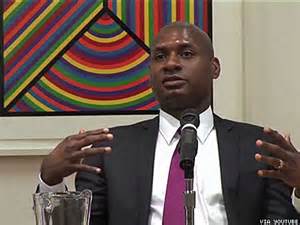A Kaffeeklatsch on Race
Share
Explore Our Galleries
Breaking News!
Today's news and culture by Black and other reporters in the Black and mainstream media.
Ways to Support ABHM?
By Charles Blow, New York Times

In our collective imaginations, we tend to conceive of the constantly called-for “national conversation on race” as having the formality of some grand conclave of consciousness — an American Truth and Reconciliation equivalent, a spiritual spectacle in which sins are confessed and blame taken and burdens lifted.
This may be ideal, but it is also exceedingly unlikely in this country, particularly in this political environment. There will be no great atoning. Reparations will not be paid. There will no sprawling absolution.

Yet we can still have a productive conversation. Indeed, I would argue that we are in the midst of a national conversation about race at this very moment. Its significance isn’t drawn from structure but from the freedom of its form.
Every discussion over a backyard fence or a cup of coffee is part of that conversation. It is the very continuity of its casualness that bolsters its profundity.
We need to stop calling for the conversation and realize that we are already having it.
Last week the F.B.I. director, James Comey, added his voice to that conversation, particularly as it relates to the relationship between law enforcement and communities of color. There were portions I found particularly potent coming from a man in his position.
He gave a list of “hard truths”…
For a video of James Comey’s speech, click here.
To read Charles Blow’s full analysis of Comey’s speech, click here.
For more Breaking News, click here.









Comments Are Welcome
Note: We moderate submissions in order to create a space for meaningful dialogue, a space where museum visitors – adults and youth –– can exchange informed, thoughtful, and relevant comments that add value to our exhibits.
Racial slurs, personal attacks, obscenity, profanity, and SHOUTING do not meet the above standard. Such comments are posted in the exhibit Hateful Speech. Commercial promotions, impersonations, and incoherent comments likewise fail to meet our goals, so will not be posted. Submissions longer than 120 words will be shortened.
See our full Comments Policy here.